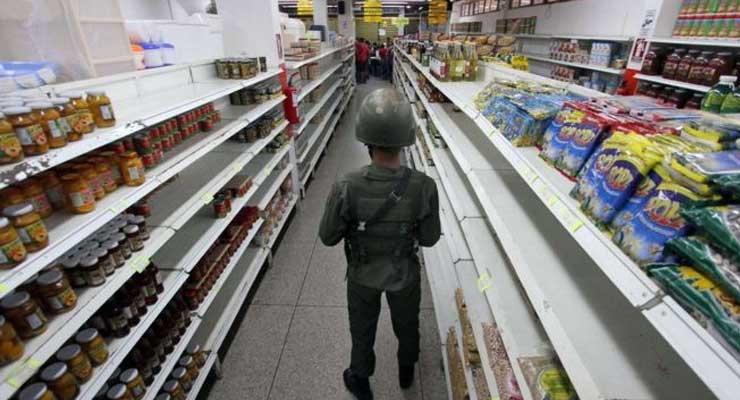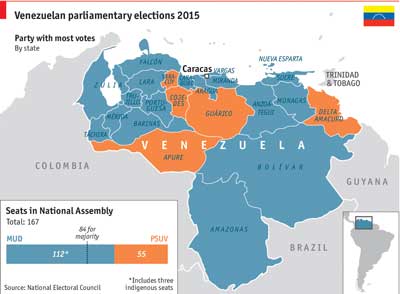
As the political and economic situation in Venezuela continues to deteriorate, it pays to look beyond the current situation and outline a possible roadmap that could guarantee the return to democratic life and the reconstitution of the national economy.
1- The opposition forces need to amalgamated into a transitional council composed of all segments of the citizenry. There needs to be an effort to incorporate Chavista elements willing to abide by the new order of things into the political process. There is a danger that the post-Maduro era will be characterized by an attempt to return to the status quo ante Chavez. The opposition needs to realize that Chavismo (like Peronismo in Argentina) will continue to be a force to be reckoned with. The best approach is to reconvert Chavismo into a center-left outfit that could potentially become the government of the day at some point.
2- Repeal the Bolivarian constitution, but legitimize the new constitutional order with the support of all the political forces. The new constitution could be the platform for political innovation. The creation of a parliamentary republic could be one of the political instruments to be implemented in order to avoid a future slide into authoritarianism. The decentralization of power that could be engendered through the creation of a parliamentary republic would establish a strong demarcation between the boundaries of the state and the government of the day.
3- The political leadership could agree to abide by an economic compact containing state policies that could be sustained for a period of 20-25 years. This type of economic compact is already in place in Peru, being an important element of political and economic stability. The implementation of this economic compact could be overseen by a newly-established Council of State; a political institution that has been a stabilizing force in countries such as Spain and France.
4- The political parties entering the electoral arena will have to abide by this compact. A serious attempt to endanger the economic and/or political compact could trigger a clause for the dissolution of any political parties wishing to rock the boat. This is an institutional element that has been used with a large degree of success in order to prevent the Islamization of Turkey.
 5- The new order of things will have to be sustained on the acknowledgement that the causes that gave rise to Chavismo can only be eradicated by ensuring the social mobility of the poorest segments of society. Educational opportunities, access to healthcare and public infrastructure are elements of paramount importance in order to propel a workable free market environment.
5- The new order of things will have to be sustained on the acknowledgement that the causes that gave rise to Chavismo can only be eradicated by ensuring the social mobility of the poorest segments of society. Educational opportunities, access to healthcare and public infrastructure are elements of paramount importance in order to propel a workable free market environment.
6- The new constitution could allocate some of the proceeds from PDVSA in order to ensure the social inclusion of the poorest segment of the citizenry. The diversion of funds from a reconstituted PDVSA into the social budget could be overseen by international and regional institutions such as MERCOSUR.
7- Free market policies needs to be reinstated immediately, including a free currency exchange mechanism and the end of import restrictions. This is the time to reboot MERCOSUR, which is, in its present configuration, a mere customs union. There needs to be an effort to integrate the countries of the bloc into a single market with a currency system along the lines of the European rate mechanism. Economic interdependence would entrench the democratic system in all member states.
8- Venezuela will need to be monitored and assisted by friendly governments in Latin America as well as international institutions and non-governmental organizations in the transition to the establishment of sound and accountable system of governance. Again, this is the turn of MERCOSUR to prove that it can be more than a customs union.
9- Chavista followers will have to be reincorporated into the political process. Banning the Partido Socialista Unido de Venezuela could lead to civil war and/or years of political infighting. The example of the De-Baathification that took place in Iraq is a powerful reminder of the risks involved in banishing political parties with a strong appeal among the citizenry. The post-Maduro political compact will have to be based on the possibility of alternation between center-right and center-left parties. The “right” needs to acknowledge that its failure to redistribute wealth led to Chavismo. The “left” needs to acknowledge that in order to exercise good governance, there cannot be a permanent quest to rock the boat.
10- An independent commission will have to examine the cases of corruption that took place during the Chávez/Maduro era. The political forces that operate in Venezuela could take a leaf from the Truth and Reconciliation Commission established in South Africa after Apartheid. The slide into Chavismo was a collective failure that requires a strong sense of responsibility from all the segments of the political spectrum in order to transition into a more responsive system of government.
Andrew Fisher says
Nicolas Lewkowicz, this is “Nature Of Reality Radio” hoist Andrew Fisher. I am scheduled to interview you tomorrow 5/12/2017 from 6-8PM Eastern Standard Time, but I lost your contact into and I can’t seem to find any way to contact you other than commenting on this article. Please send me a contact request to my Skype username “fanof2012” and send me an e-mail so I know we are set for tomorrow.